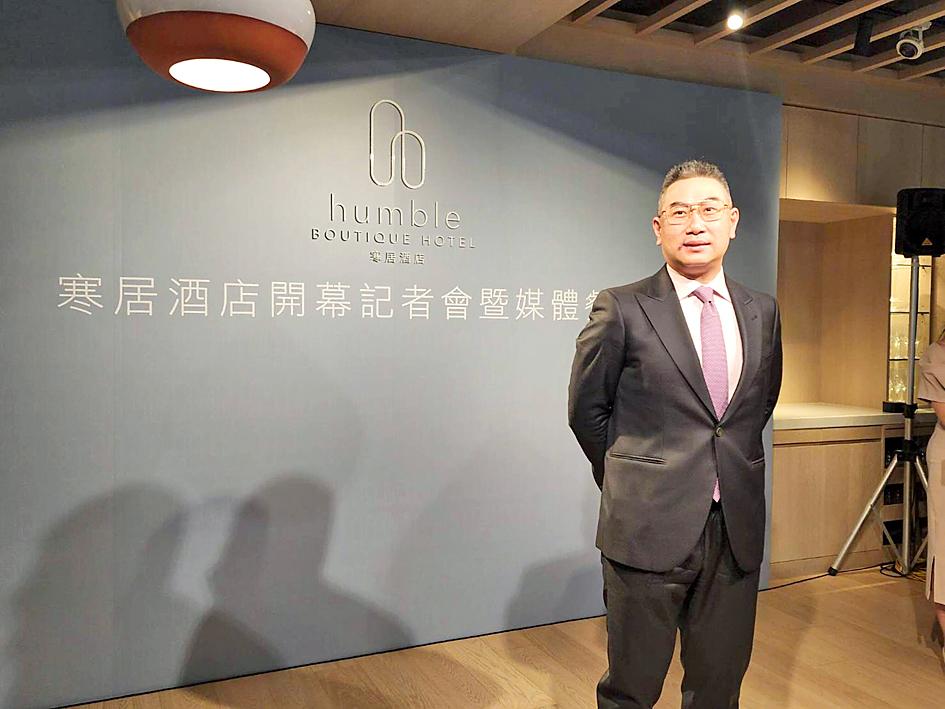Humble Boutique Hotel (寒居酒店) is targeting young domestic tourists before Taiwan lifts border controls, My Humble House Hospitality Management Consulting Co (寒舍餐旅) chairman Wilhelm Tsai (蔡伯翰) said last week.
Taiwan is likely to soon allow foreign travelers to visit again, and the lastest COVID-19 outbreak is only a slight delay to having business partners from Europe and elsewhere in Asia meet in person in Taiwan, Tsai said.
“Although international travel has been on hold for the past two years, we are pressing ahead with expansion by opening Humble Boutique, the fourth property in Taipei,” Tsai said during a grand opening ceremony on Thursday.

Photo: CNA
Humble Boutique Hotel is the group’s fifth property and is located next to the Songjiang Nanjing MRT station. It has 111 guestrooms and is aimed at business travelers who prefer mid-range accommodations, Tsai said.
Occupancy at the hotel should reach 70 percent after the initial relaxation of border controls, he added.
“Conducting business in-person would be a huge plus in securing deals when things return to normal,” Tsai said.
Taiwan is certain to reconnect with the world after the COVID-19 outbreak stabilizes, he said.
The opening of borders could come in the summer after the number of infections peaks, health experts have said.
In the meantime, Humble Boutique is focusing on young domestic tourists, Tsai said.
The hospitality industry could suffer acute labor shortages upon recovery as young people are more often qualified for well-paying jobs at tech firms, he said.
The group has offered wages of 20 percent to 50 percent higher than legally required, but it has still been difficult to fill empty positions, Tsai said, adding that competitors are experiencing similar problems.
“The government might want to consider allowing hotels to hire migrant workers,” Tsai said.

SEEKING CLARITY: Washington should not adopt measures that create uncertainties for ‘existing semiconductor investments,’ TSMC said referring to its US$165 billion in the US Taiwan Semiconductor Manufacturing Co (TSMC, 台積電) told the US that any future tariffs on Taiwanese semiconductors could reduce demand for chips and derail its pledge to increase its investment in Arizona. “New import restrictions could jeopardize current US leadership in the competitive technology industry and create uncertainties for many committed semiconductor capital projects in the US, including TSMC Arizona’s significant investment plan in Phoenix,” the chipmaker wrote in a letter to the US Department of Commerce. TSMC issued the warning in response to a solicitation for comments by the department on a possible tariff on semiconductor imports by US President Donald Trump’s

‘FAILED EXPORT CONTROLS’: Jensen Huang said that Washington should maximize the speed of AI diffusion, because not doing so would give competitors an advantage Nvidia Corp cofounder and chief executive officer Jensen Huang (黃仁勳) yesterday criticized the US government’s restrictions on exports of artificial intelligence (AI) chips to China, saying that the policy was a failure and would only spur China to accelerate AI development. The export controls gave China the spirit, motivation and government support to accelerate AI development, Huang told reporters at the Computex trade show in Taipei. The competition in China is already intense, given its strong software capabilities, extensive technology ecosystems and work efficiency, he said. “All in all, the export controls were a failure. The facts would suggest it,” he said. “The US

The government has launched a three-pronged strategy to attract local and international talent, aiming to position Taiwan as a new global hub following Nvidia Corp’s announcement that it has chosen Taipei as the site of its Taiwan headquarters. Nvidia cofounder and CEO Jensen Huang (黃仁勳) on Monday last week announced during his keynote speech at the Computex trade show in Taipei that the Nvidia Constellation, the company’s planned Taiwan headquarters, would be located in the Beitou-Shilin Technology Park (北投士林科技園區) in Taipei. Huang’s decision to establish a base in Taiwan is “primarily due to Taiwan’s talent pool and its strength in the semiconductor

French President Emmanuel Macron has expressed gratitude to Hon Hai Precision Industry Co (鴻海精密) for its plan to invest approximately 250 million euros (US$278 million) in a joint venture in France focused on the semiconductor and space industries. On his official X account on Tuesday, Macron thanked Hon Hai, also known globally as Foxconn Technology Group (富士康科技集團), for its investment projects announced at Choose France, a flagship economic summit held on Monday to attract foreign investment. In the post, Macron included a GIF displaying the national flag of the Republic of China (Taiwan), as he did for other foreign investors, including China-based